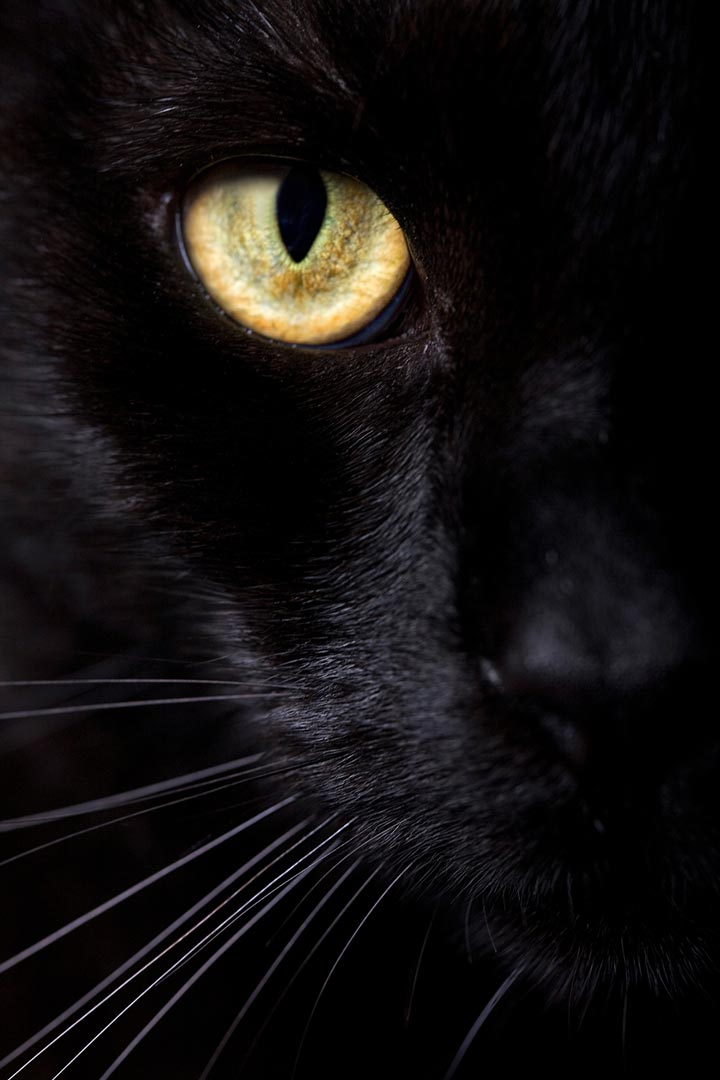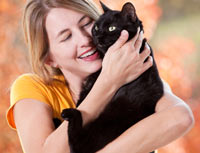Black Cats

There are so many beautiful coat colors and combinations of colors in the feline world. Still, an all-black cat is one that captures the imagination of so many people. Some folks love black cats, some are a bit nervous around them, and some have deep-rooted superstitions about them.
History of Black Cats: Why Do Some People Fear Them?
In ancient Egypt 3000 years ago, cats, in general, including black ones, were revered and considered to be able to see other worlds. One of the Egyptian goddesses, Bast, is depicted either as a cat or as part cat and part human. She was the goddess of protection and fertility.
It was a crime to harm a cat in ancient Egypt. Many of them were actually mummified in the same manner as humans were, indicating just how well they were loved.
The Egyptian practice of revering cats may have been the ultimate reason for the superstitions that eventually evolved surrounding them. The Hebrews began to believe in only one god rather than many, and they didn't follow any goddesses. They may have begun to disdain cats, associating them with a belief in multiple gods.
As the Middle Ages began, there was much in life to fear. People became sick and died without understanding the scientific roots of their illnesses. Natural disasters occurred, and people didn't understand these either. These occurrences, combined with their religious beliefs, often had people looking for something or someone to blame for sicknesses or natural disasters.
The result was a huge surge in people being named as witches. People believed that witches communed with "familiars," or members of the animal kingdom that helped with their spells. Cats, and black ones especially, were commonly considered to be witches' familiars. In fact, it was thought that the devil could become a black cat and move around on Earth, causing mayhem. Cats, as well as people who were deemed to be witches, were tortured and killed in the Middle Ages. Black cats were targeted more frequently than others. It may be that black cats were chosen to bear this intense fear and hatred because they could blend in with the shadows, appearing spooky and mysterious.
Unfortunately, one of the illnesses that brought so much fear to those living in the Middle Ages, the Black Plague, probably flourished even more because so many cats were killed. The plague was caused by a bacteria spread by rats. The rat population likely surged with their greatest predator, the cat, being persecuted and eliminated so heavily.
The fear of black cats traveled to the United States with the Puritans who first arrived here. These people were a suspicious group and always on guard against all things of the devil, including witches and their familiars.
Present Day Black Cat Fear
The fear and superstition related to black cats has held on to some extent even into modern American culture. Black cats are a symbol of Halloween, still often pictured with witches, and there is a saying that you'll have bad luck if one crosses your path.
In some areas of the world, black cats are thought to bring good luck. In Japan, black cats are lucky, and women who own them expect to have lots of men interested in dating them. In Scotland, a black cat in the home is thought to bring good financial luck.
Are Black Cats More Aggressive?
Another commonly-held belief is that black cats (and dogs) are more aggressive or just less friendly than cats of other colors. There haven't been any studies that link aggression to coat color. In fact, most owners of black cats will tell you that their feline friends are just as loving and sweet as cats of other colors.
The Luck of Black Cats
Unfortunately, the superstitions surrounding black cats have created some bad "luck" for them, as well. Black cats are often overlooked at shelters. People pass them by for other colors and color combinations. While this could be simply because people don't find black cats as attractive as those with other coat colors, it's more likely the result of our deep-rooted, long-held cultural superstitions and fears about black cats.
Sometimes these beliefs can take an even more sinister turn, and disturbed or incredibly misguided people may capture, torture, and kill black cats. It is believed that this problem may be worse around Halloween, and some animal shelters refuse to adopt out black cats for a period of time around that holiday.
Whether or not there is an upsurge in the abuse of black cats around Halloween is a matter of debate. Some officials say there is no evidence that it happens while others vehemently argue that it does.
While it may or may not be true that black cats are abused more often at this time of year, it is common for people to adopt black cats from shelters solely for the purpose of being Halloween party props. These cats are usually abandoned outside after Halloween.

Black Cats are Simply Cats
The truth about black cats should be easy to see in our modern world, with the benefit of science to explain our illnesses and natural disasters. They are simply cats like those of any other color. They have their own personalities: some are loving, some are aloof, some playful, and some sedate. They look to us humans for companionship and care. They don't bring luck, bad or good, with them when they come into our lives, but they do bring smiles, love, and laughs. So if you're heading to the shelter to bring a feline companion home, don't overlook the black cats in the cages. They're hoping you'll pick them just as much as the other cats are.
When you get your new black buddy home, you'll need a name. There are many clever names that people use for black cats, though you could just pick one that suits your new addition's personality, too.
You May Also Like These Articles:
The Dangers of Strings, Ribbons, and Yarn for Cats
Pica in Cats: Why Cats Eat Strange Things
Pet Insurance: Peace of Mind for Your Cat's Health
How to Keep Your Cat off the Christmas Tree
Notice: Ask-a-Vet is an affiliated service for those who wish to speak with a veterinary professional about their pet's specific condition. Initially, a bot will ask questions to determine the general nature of your concern. Then, you will be transferred to a human. There is a charge for the service if you choose to connect to a veterinarian. Ask-a-Vet is not manned by the staff or owners of CatHealth.com, and the advice given should not delay or replace a visit to your veterinarian.





